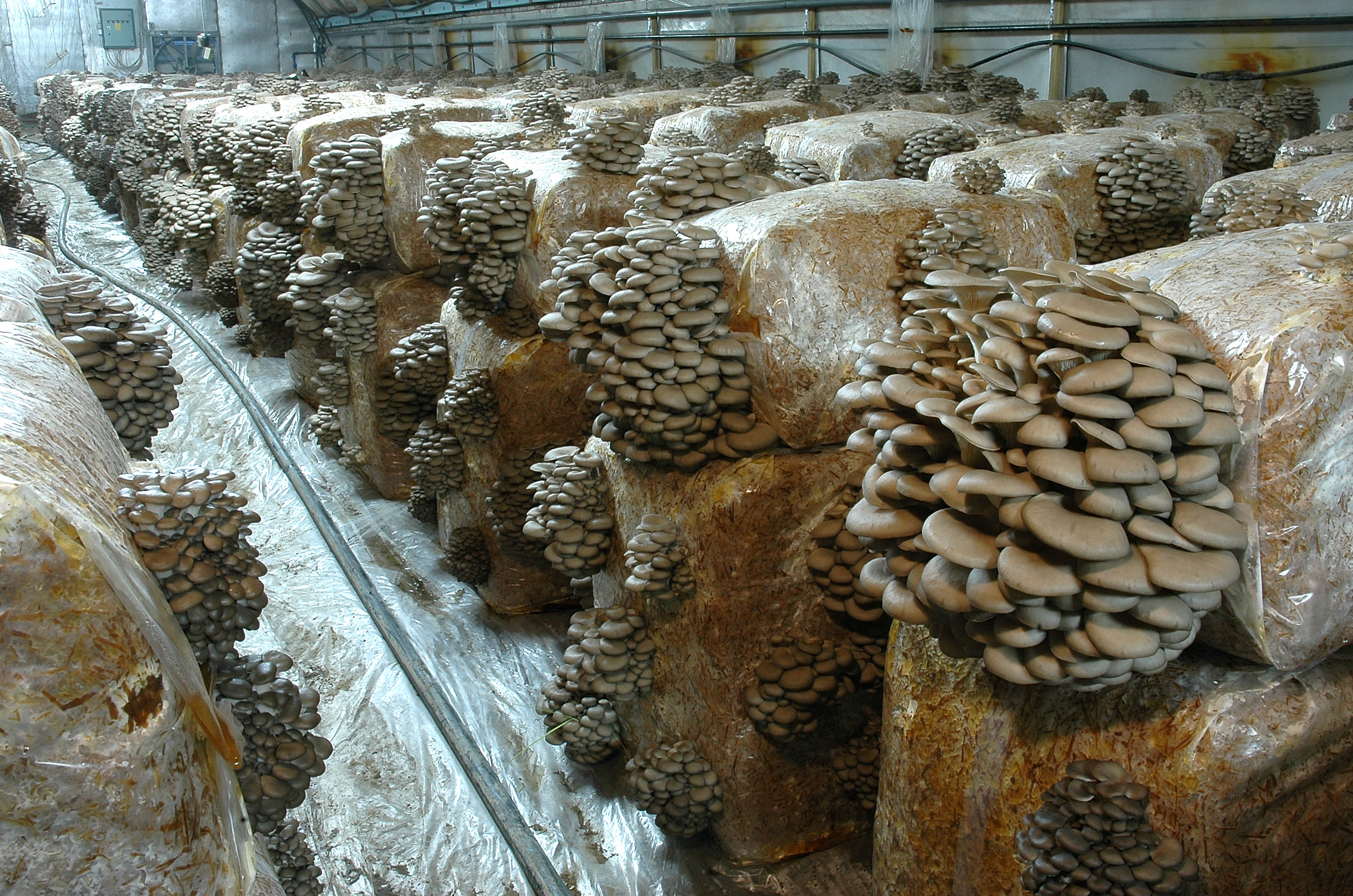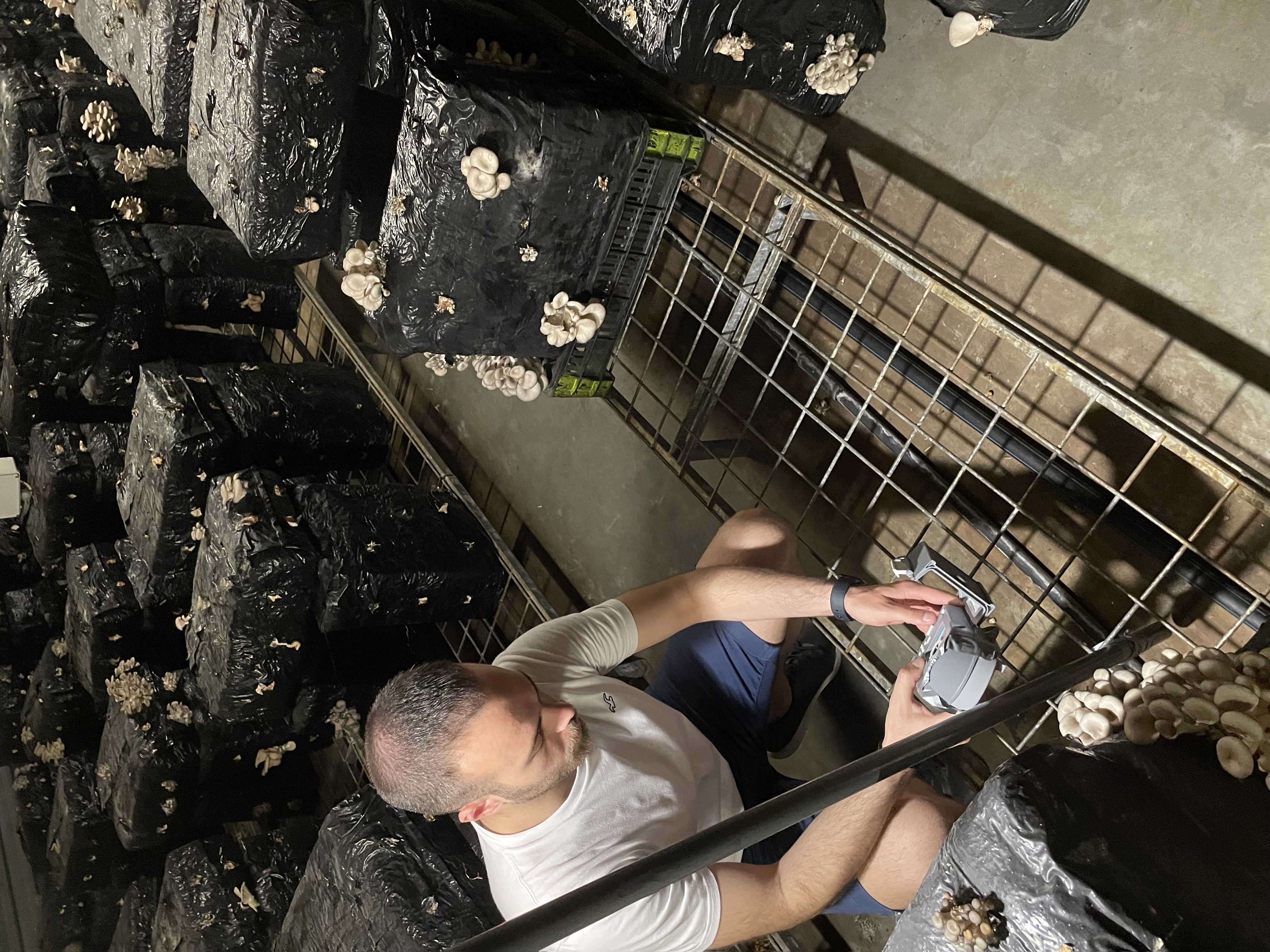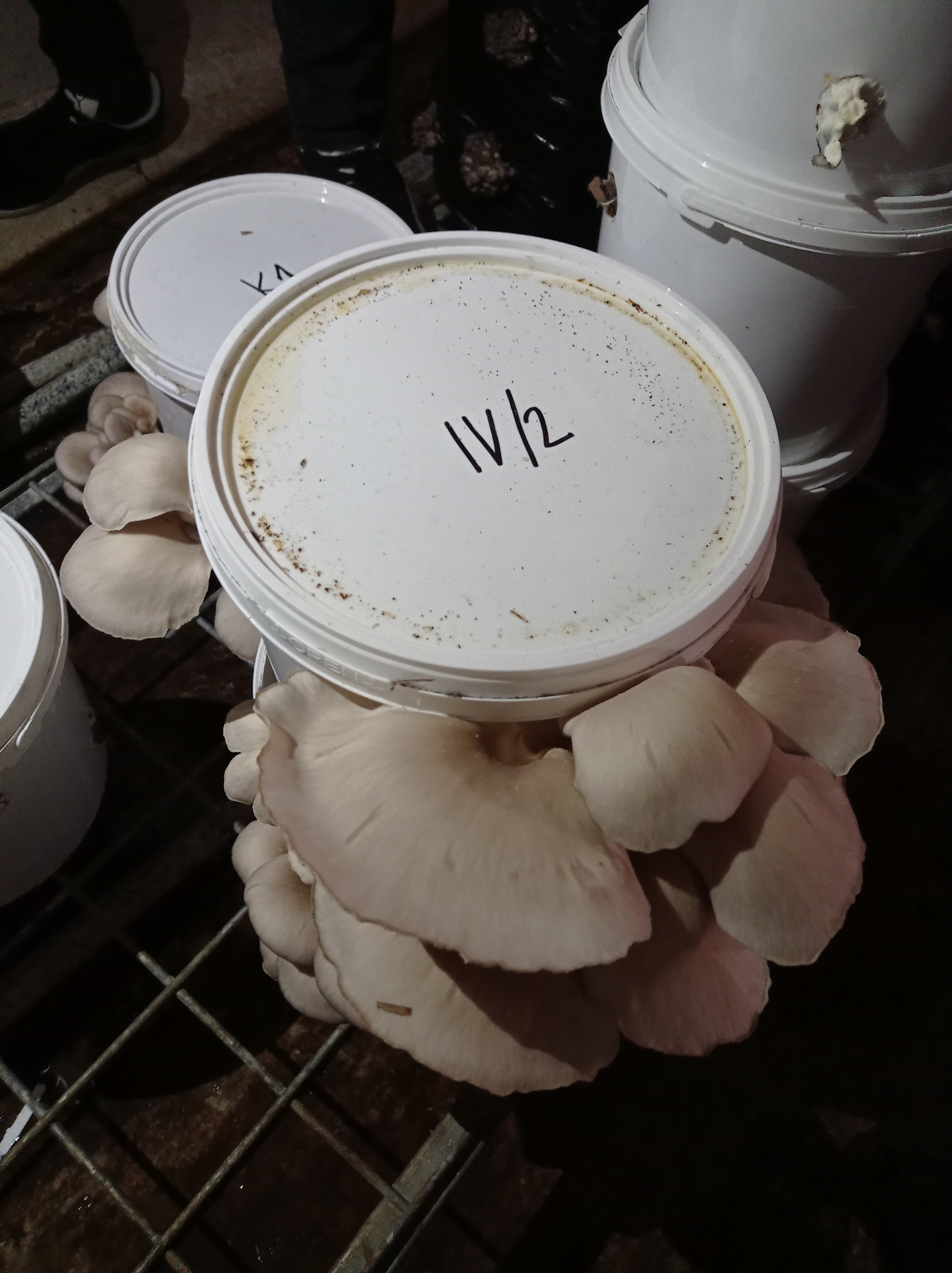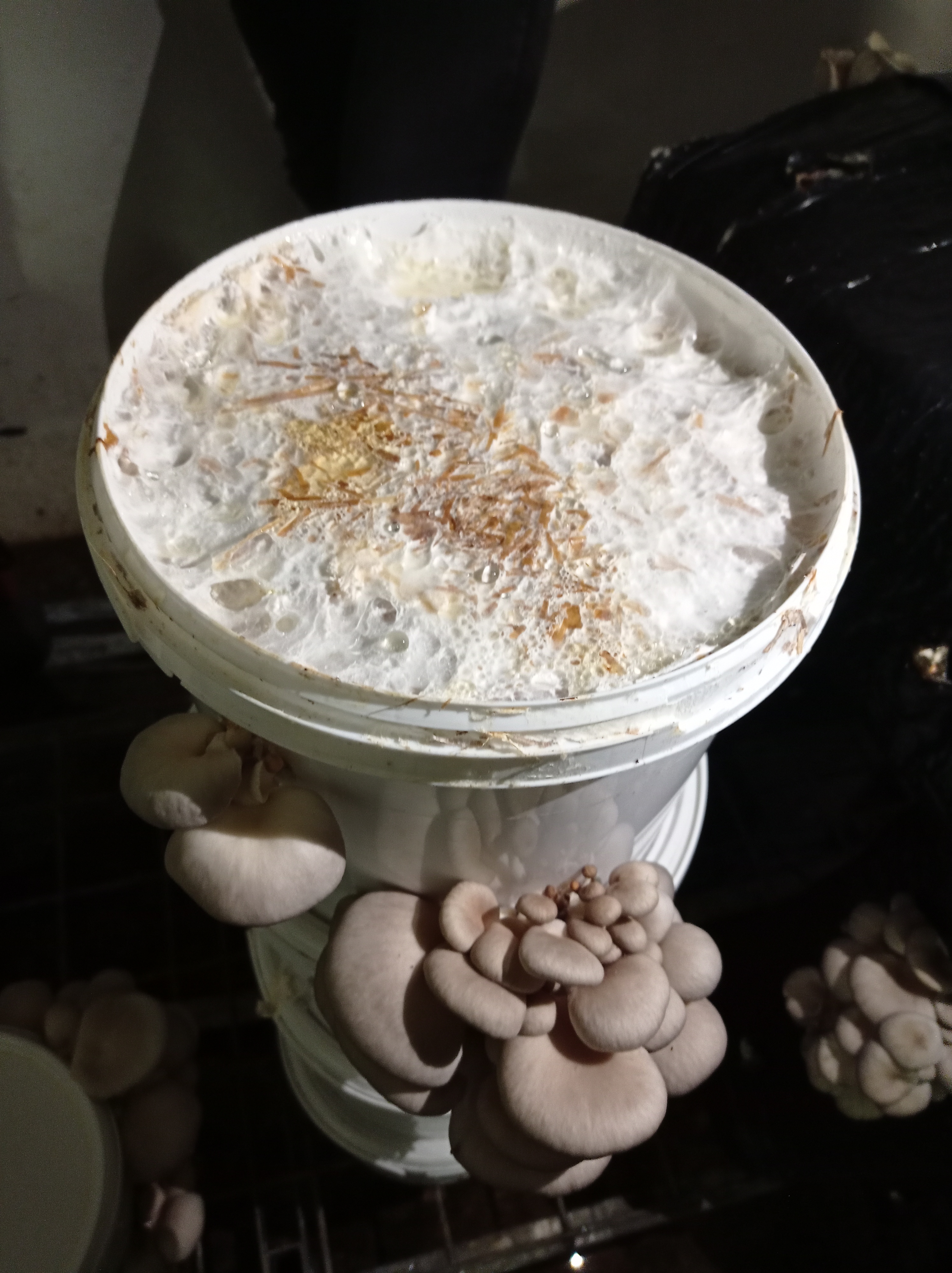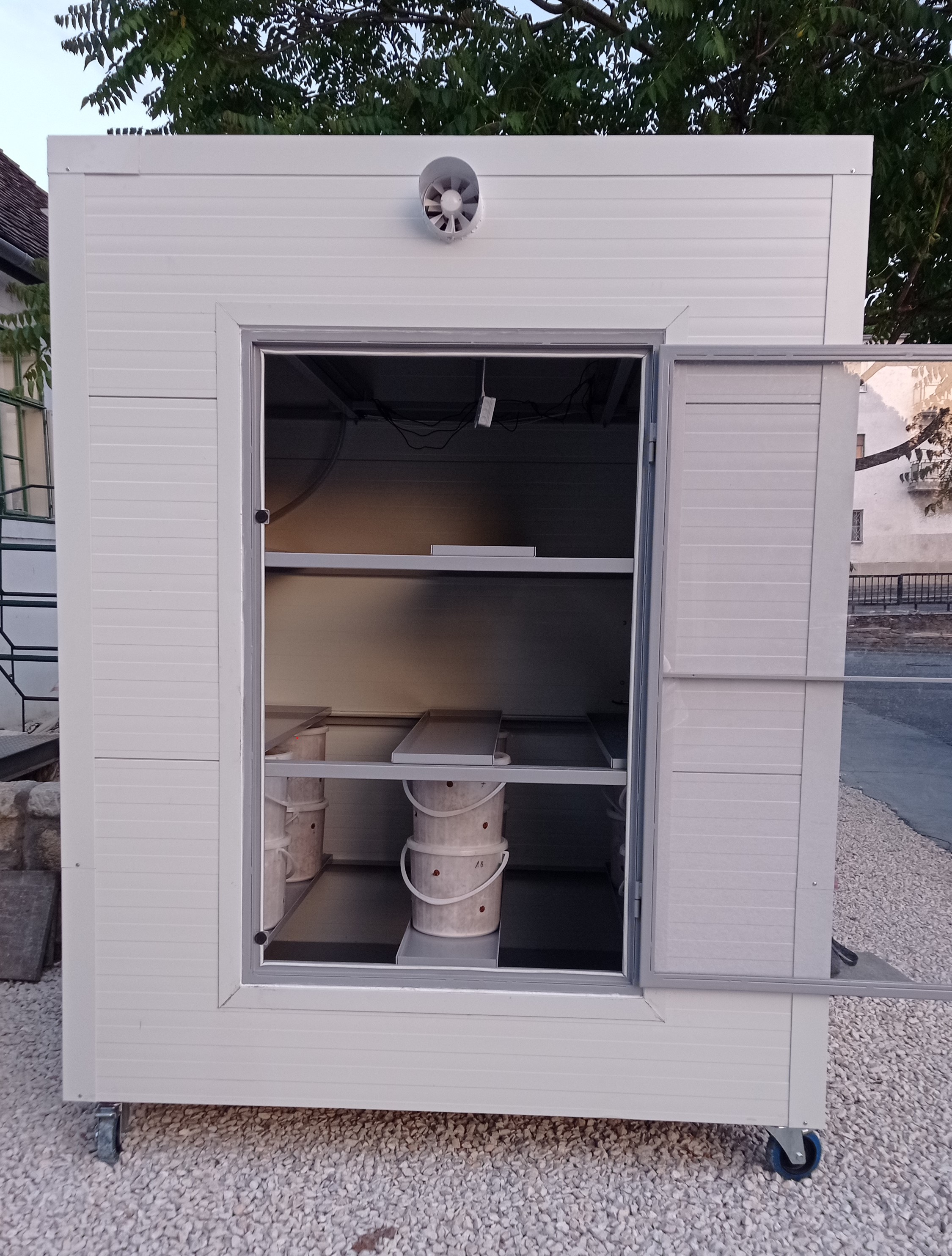Reconnecting with nature
MUSHNOMICS
Unlocking data-driven innovation for improving productivity and data sharing in mushroom value chain
MUSHNOMICS is revolutionizing mushroom farming with cutting-edge digital technology! By integrating smart sensors, AI, and IoT, the project optimizes production, reduces waste, and enhances economic sustainability across the entire mushroom value chain. A data-driven future for better yields, lower costs, and a greener agri-food system!
Romania
Local
Baia Mare
It addresses urban-rural linkages
It refers to other types of transformations (soft investment)
Yes
2024-02-29
Yes
ICT-AGRI-FOOD 2019 Joint Call
No
Yes
Yes
Yes
As a representative of an organisation
MUSHNOMICS revolutionizes mushroom farming through digital innovation, integrating AI, IoT, and smart sensors to enhance sustainability, optimize yields, and minimize waste. By transforming agro-industrial and urban waste into high-quality food, the project strengthens circular economy practices while fostering a deeper connection between food production, nature, and society.
Target Groups:
-Mushroom growers, agri-food businesses, and entrepreneurs seeking sustainable solutions.
-Researchers and policymakers focusing on digital agriculture and sustainability.
-Urban communities and consumers looking for local, nature-friendly food options.
Objectives:
-Enhance resource efficiency – Optimize mushroom production using real-time AI-driven analytics.
-Foster circular economy – Convert agricultural waste into sustainable growing substrates.
-Promote urban farming – Develop modular container farms for local food production.
-Reconnect people with nature – Engage communities through education and digital tools.
-Support biodiversity & soil health – Valorize spent mushroom substrate (SMS) for composting and biofertilizers.
Achieved Outcomes:
-Developed the MUSHNOMICS Digital Platform for real-time farm monitoring.
-Optimized sustainable mushroom farming with commercial-scale AI-driven solutions.
-Reduced waste by repurposing SMS, contributing to a zero-waste strategy.
-Encouraged urban food production through scalable, modular farms.
-Engaged communities in sustainable agriculture through knowledge-sharing initiatives.
MUSHNOMICS reconnects people with nature by merging cutting-edge technology with ecological practices, fostering a resilient, resource-efficient, and environmentally friendly food system.
Target Groups:
-Mushroom growers, agri-food businesses, and entrepreneurs seeking sustainable solutions.
-Researchers and policymakers focusing on digital agriculture and sustainability.
-Urban communities and consumers looking for local, nature-friendly food options.
Objectives:
-Enhance resource efficiency – Optimize mushroom production using real-time AI-driven analytics.
-Foster circular economy – Convert agricultural waste into sustainable growing substrates.
-Promote urban farming – Develop modular container farms for local food production.
-Reconnect people with nature – Engage communities through education and digital tools.
-Support biodiversity & soil health – Valorize spent mushroom substrate (SMS) for composting and biofertilizers.
Achieved Outcomes:
-Developed the MUSHNOMICS Digital Platform for real-time farm monitoring.
-Optimized sustainable mushroom farming with commercial-scale AI-driven solutions.
-Reduced waste by repurposing SMS, contributing to a zero-waste strategy.
-Encouraged urban food production through scalable, modular farms.
-Engaged communities in sustainable agriculture through knowledge-sharing initiatives.
MUSHNOMICS reconnects people with nature by merging cutting-edge technology with ecological practices, fostering a resilient, resource-efficient, and environmentally friendly food system.
Sustainable Agriculture
Circular Economy
Smart Farming
Digital Innovation
Urban Farming
MUSHNOMICS is dedicated to transforming mushroom production into a model of sustainability through digital innovation, circular economy principles, and resource-efficient farming. The project focuses on reducing waste, optimizing yields, and promoting eco-friendly food production.
Key Sustainability Objectives and Achievements:
1) Enhancing Resource Efficiency:
-Objective: Develop AI-driven analytics and IoT-based monitoring to optimize environmental conditions, reducing input use (water, energy, and raw materials).
-Achievement: The MUSHNOMICS Digital Platform provides real-time data for smarter decision-making, leading to improved yields with lower resource consumption.
2) Advancing Circular Economy Practices:
-Objective: Repurpose agricultural and urban waste as a growing substrate, reducing landfill waste and creating a zero-waste system.
-Achievement: Successfully demonstrated the use of spent mushroom substrate (SMS) for composting, biofertilizers, and animal feed, closing the nutrient cycle.
3) Promoting Sustainable Urban Farming:
-Objective: Develop a modular, controlled-environment mushroom farming unit for urban and peri-urban areas, reducing food miles and increasing local food resilience.
-Achievement: Created and tested a container-based mushroom farm, proving its viability for decentralized, nature-friendly food production in cities.
4) Supporting Biodiversity and Soil Health:
-Objective: Utilize SMS as a soil amendment to enrich biodiversity and enhance soil fertility.
-Achievement: Field trials confirmed SMS’s effectiveness in improving soil quality, reducing synthetic fertilizer dependency.
5) Reconnecting People with Nature:
-Objective: Raise awareness of sustainable food systems through education and digital engagement.
-Achievement: Developed open-access e-learning resources and digital tools to promote knowledge-sharing among farmers, researchers, and consumers.
Key Sustainability Objectives and Achievements:
1) Enhancing Resource Efficiency:
-Objective: Develop AI-driven analytics and IoT-based monitoring to optimize environmental conditions, reducing input use (water, energy, and raw materials).
-Achievement: The MUSHNOMICS Digital Platform provides real-time data for smarter decision-making, leading to improved yields with lower resource consumption.
2) Advancing Circular Economy Practices:
-Objective: Repurpose agricultural and urban waste as a growing substrate, reducing landfill waste and creating a zero-waste system.
-Achievement: Successfully demonstrated the use of spent mushroom substrate (SMS) for composting, biofertilizers, and animal feed, closing the nutrient cycle.
3) Promoting Sustainable Urban Farming:
-Objective: Develop a modular, controlled-environment mushroom farming unit for urban and peri-urban areas, reducing food miles and increasing local food resilience.
-Achievement: Created and tested a container-based mushroom farm, proving its viability for decentralized, nature-friendly food production in cities.
4) Supporting Biodiversity and Soil Health:
-Objective: Utilize SMS as a soil amendment to enrich biodiversity and enhance soil fertility.
-Achievement: Field trials confirmed SMS’s effectiveness in improving soil quality, reducing synthetic fertilizer dependency.
5) Reconnecting People with Nature:
-Objective: Raise awareness of sustainable food systems through education and digital engagement.
-Achievement: Developed open-access e-learning resources and digital tools to promote knowledge-sharing among farmers, researchers, and consumers.
MUSHNOMICS enhances the aesthetics and quality of experience in mushroom farming by integrating cutting-edge design, cultural appreciation, and community engagement. The project’s modular, IoT-enabled mushroom farms are visually appealing, compact, and adaptable for urban and rural settings. These container-based units introduce a sleek, modern approach to food production, blending nature with technology in a way that is both functional and aesthetically harmonious. Their design makes sustainable farming more accessible and visually integrated into cityscapes, inspiring people to rethink food production as an essential part of their environment.
Beyond physical design, MUSHNOMICS fosters cultural benefits by reconnecting communities with traditional and innovative mushroom cultivation practices. Mushrooms have deep roots in European culinary heritage, and the project celebrates this by promoting sustainable, locally grown varieties that align with cultural preferences. The project also integrates storytelling and educational elements into its outreach, enhancing public appreciation for fungi as both a nutritious food source and an ecological ally in waste recycling and soil enrichment.
The digital platform developed by MUSHNOMICS ensures an engaging and interactive experience for farmers, entrepreneurs, and consumers. Through an intuitive interface, users can visualize real-time data on mushroom growth, environmental conditions, and sustainability impacts, making the process transparent and educational. This interactive approach fosters a deeper emotional and intellectual connection between people and their food.
MUSHNOMICS serves as an exemplary model by demonstrating how sustainable food production can be seamlessly woven into urban life, cultural traditions, and modern design aesthetics.
Beyond physical design, MUSHNOMICS fosters cultural benefits by reconnecting communities with traditional and innovative mushroom cultivation practices. Mushrooms have deep roots in European culinary heritage, and the project celebrates this by promoting sustainable, locally grown varieties that align with cultural preferences. The project also integrates storytelling and educational elements into its outreach, enhancing public appreciation for fungi as both a nutritious food source and an ecological ally in waste recycling and soil enrichment.
The digital platform developed by MUSHNOMICS ensures an engaging and interactive experience for farmers, entrepreneurs, and consumers. Through an intuitive interface, users can visualize real-time data on mushroom growth, environmental conditions, and sustainability impacts, making the process transparent and educational. This interactive approach fosters a deeper emotional and intellectual connection between people and their food.
MUSHNOMICS serves as an exemplary model by demonstrating how sustainable food production can be seamlessly woven into urban life, cultural traditions, and modern design aesthetics.
MUSHNOMICS is built on the principles of inclusion, ensuring accessibility, affordability, and active participation across all levels of society. By leveraging digital technologies and smart farming innovations, the project makes sustainable mushroom cultivation available to a broad range of stakeholders, from small-scale farmers and urban growers to large agricultural enterprises. The modular design of the MUSHNOMICS production units allows for flexible implementation in both rural and urban settings, making it possible for individuals and communities with limited space or resources to engage in sustainable food production. By utilizing agro-industrial and urban waste as a primary substrate, the project reduces input costs, making mushroom cultivation more affordable and economically viable, particularly for marginalized communities and small-scale entrepreneurs.
In terms of governance and participation, MUSHNOMICS follows a multi-actor approach that actively involves farmers, researchers, policymakers, and consumers. By fostering collaboration and co-creation, the project ensures that technological developments and sustainability solutions are tailored to the needs of diverse users. The digital platform enhances accessibility by providing open-source knowledge, real-time data insights, and AI-driven decision-making tools that can be utilized by both experienced growers and newcomers to the field. This democratization of agricultural knowledge empowers more people to participate in sustainable farming and food security initiatives.
MUSHNOMICS also promotes inclusivity in design, ensuring that its solutions are user-friendly and adaptable to various levels of technological expertise. Training programs, e-learning resources, and community engagement activities have been developed to bridge knowledge gaps and make smart farming accessible to all, regardless of educational background or location.
In terms of governance and participation, MUSHNOMICS follows a multi-actor approach that actively involves farmers, researchers, policymakers, and consumers. By fostering collaboration and co-creation, the project ensures that technological developments and sustainability solutions are tailored to the needs of diverse users. The digital platform enhances accessibility by providing open-source knowledge, real-time data insights, and AI-driven decision-making tools that can be utilized by both experienced growers and newcomers to the field. This democratization of agricultural knowledge empowers more people to participate in sustainable farming and food security initiatives.
MUSHNOMICS also promotes inclusivity in design, ensuring that its solutions are user-friendly and adaptable to various levels of technological expertise. Training programs, e-learning resources, and community engagement activities have been developed to bridge knowledge gaps and make smart farming accessible to all, regardless of educational background or location.
MUSHNOMICS places citizens and civil society at the core of its mission, ensuring active participation in shaping sustainable mushroom production. From the outset, mushroom growers, urban farmers, food entrepreneurs, and consumers have provided input to refine the digital platform, modular farming units, and waste valorization strategies. Their involvement has ensured that the project directly addresses real-world challenges while remaining accessible and practical.
Through workshops, educational initiatives, and digital engagement, MUSHNOMICS has strengthened public awareness of sustainable food systems, waste reduction, and the ecological role of fungi. Community-led trials have demonstrated how urban and peri-urban environments can benefit from localized mushroom production, increasing access to fresh food while reducing environmental impact. Civil society organizations have contributed by advocating for supportive policies, ensuring that project outcomes align with broader sustainability goals.
This inclusive approach has led to user-friendly, adaptable solutions while fostering strong community ownership. By integrating the needs and perspectives of diverse stakeholders, MUSHNOMICS has evolved into more than a technological innovation—it is a movement reconnecting people with nature and promoting a resilient, community-driven food system.
Through workshops, educational initiatives, and digital engagement, MUSHNOMICS has strengthened public awareness of sustainable food systems, waste reduction, and the ecological role of fungi. Community-led trials have demonstrated how urban and peri-urban environments can benefit from localized mushroom production, increasing access to fresh food while reducing environmental impact. Civil society organizations have contributed by advocating for supportive policies, ensuring that project outcomes align with broader sustainability goals.
This inclusive approach has led to user-friendly, adaptable solutions while fostering strong community ownership. By integrating the needs and perspectives of diverse stakeholders, MUSHNOMICS has evolved into more than a technological innovation—it is a movement reconnecting people with nature and promoting a resilient, community-driven food system.
The MUSHNOMICS project engaged stakeholders at various levels (local, regional, national, European) through several key strategies:
1. Early and continuous consultation: Stakeholders were identified and consulted throughout the project to gather feedback and ensure the project's direction aligned with their needs. This process began early in the project's lifecycle.
2. Co-creation and feedback: Local stakeholder groups were established to facilitate co-creation and gather feedback on project progress, ensuring that development was guided by real-world input and leading to practical results.
3. Technology assessment: Stakeholders played a crucial role in assessing and validating the project's digital technology solutions, providing feedback that ensured the technologies were user-friendly and met the agri-food sector's needs.
4. Varied engagement methods: The project employed surveys, interviews, workshops, and field visits to engage stakeholders, ensuring diverse perspectives were included.
The added value of this engagement was significant:
-It ensured the project met the agri-food sector's real-world needs.
-It increased the likelihood of successful project implementation and exploitation.
-It built a strong support network for the project.
-It contributed to the development of sustainable and resilient agri-food systems.
1. Early and continuous consultation: Stakeholders were identified and consulted throughout the project to gather feedback and ensure the project's direction aligned with their needs. This process began early in the project's lifecycle.
2. Co-creation and feedback: Local stakeholder groups were established to facilitate co-creation and gather feedback on project progress, ensuring that development was guided by real-world input and leading to practical results.
3. Technology assessment: Stakeholders played a crucial role in assessing and validating the project's digital technology solutions, providing feedback that ensured the technologies were user-friendly and met the agri-food sector's needs.
4. Varied engagement methods: The project employed surveys, interviews, workshops, and field visits to engage stakeholders, ensuring diverse perspectives were included.
The added value of this engagement was significant:
-It ensured the project met the agri-food sector's real-world needs.
-It increased the likelihood of successful project implementation and exploitation.
-It built a strong support network for the project.
-It contributed to the development of sustainable and resilient agri-food systems.
The MUSHNOMICS project brought together a diverse group of experts from various fields, including:
-Computer Engineering: Experts in this field contributed to the development of the ICT platform and data analysis tools.
-Agronomy: Agronomists provided their expertise on mushroom cultivation and optimization techniques.
-Horticultural Biotechnology: Specialists in this area focused on the utilization of mushroom by-products and waste management.
-Environmental Science: Environmental scientists assessed the project's impact on the environment and explored ways to minimize its footprint.
-Agricultural Engineering: Agricultural engineers worked on the design and implementation of the MUSHNOMICS Module.
These representatives interacted through regular meetings, workshops, and collaborative research activities. They also exchanged knowledge and ideas through a dedicated online platform. The added value of this process was:
-Holistic solutions: The interdisciplinary collaboration led to the development of well-rounded solutions that considered all aspects of the mushroom value chain.
-Innovative approaches: The exchange of ideas between different fields sparked innovative approaches to mushroom production and waste management.
-Increased efficiency: The integration of various expertise streamlined the research and development process, leading to increased efficiency.
-Computer Engineering: Experts in this field contributed to the development of the ICT platform and data analysis tools.
-Agronomy: Agronomists provided their expertise on mushroom cultivation and optimization techniques.
-Horticultural Biotechnology: Specialists in this area focused on the utilization of mushroom by-products and waste management.
-Environmental Science: Environmental scientists assessed the project's impact on the environment and explored ways to minimize its footprint.
-Agricultural Engineering: Agricultural engineers worked on the design and implementation of the MUSHNOMICS Module.
These representatives interacted through regular meetings, workshops, and collaborative research activities. They also exchanged knowledge and ideas through a dedicated online platform. The added value of this process was:
-Holistic solutions: The interdisciplinary collaboration led to the development of well-rounded solutions that considered all aspects of the mushroom value chain.
-Innovative approaches: The exchange of ideas between different fields sparked innovative approaches to mushroom production and waste management.
-Increased efficiency: The integration of various expertise streamlined the research and development process, leading to increased efficiency.
The MUSHNOMICS project is an innovative project that aims to improve the productivity and data sharing in the mushroom value chain. The project will develop a dynamic data-driven analytics platform for multi-domain mushroom production environments. The platform will use AI-driven algorithms to optimize yield, lower costs, and improve the economic viability of the agri-food sector. The project will also develop an ICT platform to exchange data and information from production to points of sale along the entire value chain. The MUSHNOMICS project is innovative because it is one of the first projects to use AI and big data analytics to improve mushroom production. The project is also innovative in its approach to data sharing. The ICT platform that will be developed by the project will allow for the secure and efficient exchange of data between all stakeholders in the mushroom value chain. This will help to improve transparency and traceability in the sector. The MUSHNOMICS project has the potential to make a significant contribution to the agri-food sector. The project's innovative approach to data-driven analytics and data sharing could help to improve the productivity, efficiency, and sustainability of the sector.
MUSHNOMICS employed a comprehensive, systems-based approach, taking into account the entire mushroom value chain, "from producer to consumer." The project aimed to demonstrate the feasibility of dynamic data-driven analytics for multi-domain mushroom production environments. This involved optimizing yield, lowering costs, and improving the economic viability of the agri-food sector. The methodology incorporated:
-IoT-enabled mushroom production: The project utilized smart sensors and IoT devices to collect and analyze data from mushroom production environments.
-AI and big data analytics: Artificial intelligence and big data analytics were used to analyze data and provide insights for optimizing mushroom production.
-ICT platform development: The project focused on developing an ICT platform to facilitate data sharing and information exchange along the entire value chain.
-Full-chain systems-based approach: The project considered all aspects of the mushroom value chain, from production to consumption.
-TRL 7: The project was set to technology readyness level 7.
-IoT-enabled mushroom production: The project utilized smart sensors and IoT devices to collect and analyze data from mushroom production environments.
-AI and big data analytics: Artificial intelligence and big data analytics were used to analyze data and provide insights for optimizing mushroom production.
-ICT platform development: The project focused on developing an ICT platform to facilitate data sharing and information exchange along the entire value chain.
-Full-chain systems-based approach: The project considered all aspects of the mushroom value chain, from production to consumption.
-TRL 7: The project was set to technology readyness level 7.
The MUSHNOMICS project has several elements that could be replicated or transferred:
1) IoT-enabled Mushroom Production: The use of smart sensors and IoT devices to monitor and control mushroom production environments can be replicated in other agricultural settings. This technology allows for precise environmental control, leading to optimized yields and resource efficiency.
2) Data-Driven Analytics:The methodology of using AI and big data analytics to analyze production data can be applied to other agri-food sectors. This approach enables data-driven decision-making, improving overall efficiency and sustainability.
3) ICT Platform for Data Sharing: The development of an ICT platform to facilitate data sharing along the value chain can be transferred to other agricultural supply chains. This enhances transparency and traceability, benefiting all stakeholders.
4) Modular Container Farm Unit: The concept of the 'MUSHNOMICS Module' an IoT-based and environment-controlled modular container farm unit, is highly replicable. This type of system can be placed in urban areas, or other areas where traditional farming is difficult.
5) Full-Chain Systems-Based Approach: The project's holistic approach, considering the entire value chain, can be adopted by other agricultural projects. This ensures that all aspects of production, processing, and distribution are taken into account.
6) Utilization of Waste:The processes used to utilize agro-industrial and urban waste as feedstock for mushroom cultivation, and the valorisation of spent mushroom substrate, can be replicated in other areas that are looking for ways to improve waste processing.
1) IoT-enabled Mushroom Production: The use of smart sensors and IoT devices to monitor and control mushroom production environments can be replicated in other agricultural settings. This technology allows for precise environmental control, leading to optimized yields and resource efficiency.
2) Data-Driven Analytics:The methodology of using AI and big data analytics to analyze production data can be applied to other agri-food sectors. This approach enables data-driven decision-making, improving overall efficiency and sustainability.
3) ICT Platform for Data Sharing: The development of an ICT platform to facilitate data sharing along the value chain can be transferred to other agricultural supply chains. This enhances transparency and traceability, benefiting all stakeholders.
4) Modular Container Farm Unit: The concept of the 'MUSHNOMICS Module' an IoT-based and environment-controlled modular container farm unit, is highly replicable. This type of system can be placed in urban areas, or other areas where traditional farming is difficult.
5) Full-Chain Systems-Based Approach: The project's holistic approach, considering the entire value chain, can be adopted by other agricultural projects. This ensures that all aspects of production, processing, and distribution are taken into account.
6) Utilization of Waste:The processes used to utilize agro-industrial and urban waste as feedstock for mushroom cultivation, and the valorisation of spent mushroom substrate, can be replicated in other areas that are looking for ways to improve waste processing.
Read documents
Response finalized
The MUSHNOMICS project addresses global challenges related to food security, waste management and climate change, by providing local, circular solutions which can be implemented in a range of environments. Here's how:
1. Food Security
The Challenge: By 2025, 1.8 billion people will be living in countries or regions with absolute water scarcity, and two-thirds of the world's population could be subject to water stress.
The Solution: MUSHNOMICS uses 90% less water than traditional farming by using vertical farming techniques. This is a sustainable approach to food production that can be implemented in urban areas or regions with limited water resources.
2. Waste Management
The Challenge: Food waste is a major problem worldwide. About 1/3 of the food produced for human consumption is lost or wasted.
The Solution: MUSHNOMICS uses a closed-loop system that reuses waste as fertilizer and animal feed. This approach not only reduces waste but also creates a circular economy.
3. Climate Change
The Challenge: Agriculture is a major contributor to climate change, accounting for about 10-12% of global greenhouse gas emissions.
The Solution: MUSHNOMICS uses sustainable agricultural practices that reduce greenhouse gas emissions. These include reducing transportation (fresh produce travels only a few kilometers to reach grocery store shelves), using less water, and reducing waste.
Response finalized
The MUSHNOMICS project addresses global challenges related to food security, waste management and climate change, by providing local, circular solutions which can be implemented in a range of environments. Here's how:
1. Food Security
The Challenge: By 2025, 1.8 billion people will be living in countries or regions with absolute water scarcity, and two-thirds of the world's population could be subject to water stress.
The Solution: MUSHNOMICS uses 90% less water than traditional farming by using vertical farming techniques. This is a sustainable approach to food production that can be implemented in urban areas or regions with limited water resources.
2. Waste Management
The Challenge: Food waste is a major problem worldwide. About 1/3 of the food produced for human consumption is lost or wasted.
The Solution: MUSHNOMICS uses a closed-loop system that reuses waste as fertilizer and animal feed. This approach not only reduces waste but also creates a circular economy.
3. Climate Change
The Challenge: Agriculture is a major contributor to climate change, accounting for about 10-12% of global greenhouse gas emissions.
The Solution: MUSHNOMICS uses sustainable agricultural practices that reduce greenhouse gas emissions. These include reducing transportation (fresh produce travels only a few kilometers to reach grocery store shelves), using less water, and reducing waste.
Results and Outcomes:
1.Development of an ICT Platform: The project successfully developed an ICT platform that facilitates data sharing and information exchange along the entire mushroom value chain, from production to point of sale. This platform integrates smart sensors, AI deep learning, and big data analytics.
2.MUSHNOMICS Module: A key outcome is the development of the "MUSHNOMICS Module," a retrofitted container designed for environment-controlled mushroom cultivation. This modular system enables optimized production through real-time data analysis and remote control.
3.Data-Driven Analytics: The project demonstrated the feasibility of using dynamic data-driven analytics to optimize mushroom production, leading to improved yields and reduced costs.
4.Improved Economic Viability: By optimizing production processes and enhancing data sharing, MUSHNOMICS contributes to the improved economic viability of the mushroom agri-food sector.
Impacts and Benefits:
1.For Mushroom Growers/Entrepreneurs: The MUSHNOMICS Module and ICT platform provide tools for informed decision-making, leading to increased efficiency and profitability.
2.For the Agri-Food Sector: The project's innovations contribute to a more sustainable and efficient agri-food sector by reducing waste, optimizing resource use, and enhancing transparency.
3.For Consumers: Improved production practices and data sharing enhance traceability and quality assurance, benefiting consumers with access to high-quality mushrooms.
4.Environmental Benefits: The project contributes to a circular economy, by the use of waste products.
5.Technological Advancement: The project has advanced the use of IoT, AI and big data analytics within the agricultural sector.
In essence, MUSHNOMICS has delivered tangible technological solutions and knowledge that empower stakeholders across the mushroom value chain, fostering sustainability and economic growth.
1.Development of an ICT Platform: The project successfully developed an ICT platform that facilitates data sharing and information exchange along the entire mushroom value chain, from production to point of sale. This platform integrates smart sensors, AI deep learning, and big data analytics.
2.MUSHNOMICS Module: A key outcome is the development of the "MUSHNOMICS Module," a retrofitted container designed for environment-controlled mushroom cultivation. This modular system enables optimized production through real-time data analysis and remote control.
3.Data-Driven Analytics: The project demonstrated the feasibility of using dynamic data-driven analytics to optimize mushroom production, leading to improved yields and reduced costs.
4.Improved Economic Viability: By optimizing production processes and enhancing data sharing, MUSHNOMICS contributes to the improved economic viability of the mushroom agri-food sector.
Impacts and Benefits:
1.For Mushroom Growers/Entrepreneurs: The MUSHNOMICS Module and ICT platform provide tools for informed decision-making, leading to increased efficiency and profitability.
2.For the Agri-Food Sector: The project's innovations contribute to a more sustainable and efficient agri-food sector by reducing waste, optimizing resource use, and enhancing transparency.
3.For Consumers: Improved production practices and data sharing enhance traceability and quality assurance, benefiting consumers with access to high-quality mushrooms.
4.Environmental Benefits: The project contributes to a circular economy, by the use of waste products.
5.Technological Advancement: The project has advanced the use of IoT, AI and big data analytics within the agricultural sector.
In essence, MUSHNOMICS has delivered tangible technological solutions and knowledge that empower stakeholders across the mushroom value chain, fostering sustainability and economic growth.

